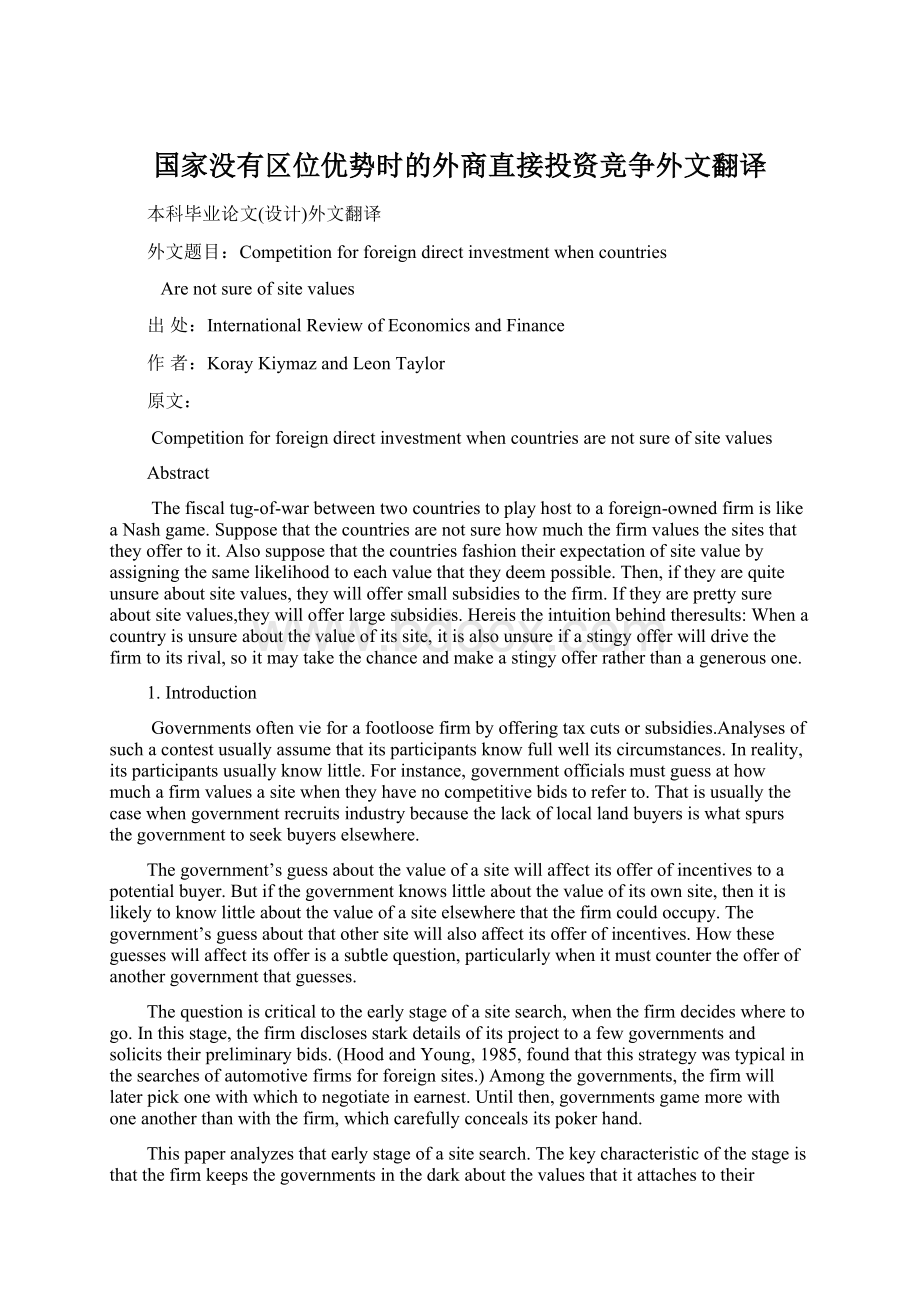国家没有区位优势时的外商直接投资竞争外文翻译.docx
《国家没有区位优势时的外商直接投资竞争外文翻译.docx》由会员分享,可在线阅读,更多相关《国家没有区位优势时的外商直接投资竞争外文翻译.docx(7页珍藏版)》请在冰豆网上搜索。

国家没有区位优势时的外商直接投资竞争外文翻译
本科毕业论文(设计)外文翻译
外文题目:
Competitionforforeigndirectinvestmentwhencountries
Arenotsureofsitevalues
出处:
InternationalReviewofEconomicsandFinance
作者:
KorayKiymazandLeonTaylor
原文:
Competitionforforeigndirectinvestmentwhencountriesarenotsureofsitevalues
Abstract
Thefiscaltug-of-warbetweentwocountriestoplayhosttoaforeign-ownedfirmislikeaNashgame.Supposethatthecountriesarenotsurehowmuchthefirmvaluesthesitesthattheyoffertoit.Alsosupposethatthecountriesfashiontheirexpectationofsitevaluebyassigningthesamelikelihoodtoeachvaluethattheydeempossible.Then,iftheyarequiteunsureaboutsitevalues,theywilloffersmallsubsidiestothefirm.Iftheyareprettysureaboutsitevalues,theywillofferlargesubsidies.Hereistheintuitionbehindtheresults:
Whenacountryisunsureaboutthevalueofitssite,itisalsounsureifastingyofferwilldrivethefirmtoitsrival,soitmaytakethechanceandmakeastingyofferratherthanagenerousone.
1.Introduction
Governmentsoftenvieforafootloosefirmbyofferingtaxcutsorsubsidies.Analysesofsuchacontestusuallyassumethatitsparticipantsknowfullwellitscircumstances.Inreality,itsparticipantsusuallyknowlittle.Forinstance,governmentofficialsmustguessathowmuchafirmvaluesasitewhentheyhavenocompetitivebidstoreferto.Thatisusuallythecasewhengovernmentrecruitsindustrybecausethelackoflocallandbuyersiswhatspursthegovernmenttoseekbuyerselsewhere.
Thegovernment’sguessaboutthevalueofasitewillaffectitsofferofincentivestoapotentialbuyer.Butifthegovernmentknowslittleaboutthevalueofitsownsite,thenitislikelytoknowlittleaboutthevalueofasiteelsewherethatthefirmcouldoccupy.Thegovernment’sguessaboutthatothersitewillalsoaffectitsofferofincentives.Howtheseguesseswillaffectitsofferisasubtlequestion,particularlywhenitmustcountertheofferofanothergovernmentthatguesses.
Thequestioniscriticaltotheearlystageofasitesearch,whenthefirmdecideswheretogo.Inthisstage,thefirmdisclosesstarkdetailsofitsprojecttoafewgovernmentsandsolicitstheirpreliminarybids.(HoodandYoung,1985,foundthatthisstrategywastypicalinthesearchesofautomotivefirmsforforeignsites.)Amongthegovernments,thefirmwilllaterpickonewithwhichtonegotiateinearnest.Untilthen,governmentsgamemorewithoneanotherthanwiththefirm,whichcarefullyconcealsitspokerhand.
Thispaperanalyzesthatearlystageofasitesearch.Thekeycharacteristicofthestageisthatthefirmkeepsthegovernmentsinthedarkaboutthevaluesthatitattachestotheirindustrialsites.Thepaperconsidershowtheresultinguncertaintyofgovernmentsaffectstheiroffersofincentivestothefirm.
Onecanobtainsharpanswerstothisquestionbecauseonecanreasonablypresumethatthegovernmentsaresureaboutafewthings.Inparticular,onecanpresumethateachgovernmentissureofhowtheotherwouldcounteritsoffer,foritislikelythatthegovernmentshavegamedbefore,perhapsintheconductofforeignrelations.Weneednotpresume,however,thateithergovernmentissureofhowthefirmwouldreacttotheiroffers.
Ingeneral,ouranalysisappliestoeconomiccompetitionbetweengovernmentsatthelocal,state,ornationallevel.Inparticular,itwillmotivatethemathematicsbyaddressingcontestsbetweencountriesforforeigndirectinvestment(FDI).
Wefavortheinternationalapplicationforitstimeliness.Throughthe1970sanduntilthelate1980s,analystspositedthattheforeignfirmandthehosttreatedoneanotherwarily,likemonopolies.Vernon’s1971modelofbilateralmonopolydominatedtheliterature,andtheshiftofbargainingpowerfromoilextractorstooilproducersdominatedthenews.Inrecentyears,however,ThirdWorldhostshaveviedforforeignfirmsbyofferingsubsidiestothemaswellasbyliftingrestrictionsonthem.
Overtime,modelsofcompetitionthatcanapplytocountriesvyingforforeigndirectinvestmenthavecometostresstheaggressivetacticsofthepotentialhostsinpursuingfirms:
theconstructionofinfrastructuretoenticethem;thewillingnesstoreopennegotiationswiththemoreventobidinanauctionforthem.DoyleandvanWijnbergen(1994)analyzedafirmthatprocurestaxholidaysbybargainingwithoneGovernmentatatime.Bondandamuelson(1986)tookasimilartack,andAndersson(1991)examinedhowsequentialbargainingaffectsthedistributionofgainsfromforeigndirectinvestmentbetweenhostandfirm.BlackandHoyt(1989)modelafirmThatnegotiateswithseveralgovernmentsatthesametimeandthenchoosesitslocationonceandforall.Inanewtradition,KingandWelling(1992)examineafirmthatcanrelocate.Ineachoftwoperiods,thefirmconductsanauctionbetweentworegionsbiddingforitsplant.Kingetal.(1993)extendthemodelsothatgovernmentscanbuildinfrastructurefirstandthenbidinanauctionforafirm.
Severalofthesemodelsallowforuncertainty.Forexample,BlackandHoytexamineuncertaintyabouthowmuchthefirmcanproduceinonesiteratherthananother,andKingandWellingconsideruncertaintyoverthesunkcostofbuildingtheplant.Thecontributionthatourarticletriestomaketothisliterature,however,focusesonheuncertaintyofpotentialhostsabouttherelativevalueoftheirplantsites.
Thatafewcountriesnowcompeteforafootloosefirmisthemainpointofdepartureforouranalysisofuncertainty.Inparticular,webranchfromtheworkthattreats,asparamount,theuncertaintythataffectsbargainingbetweenthefirmanditschosenhost.Webranchfromthisworkbecause—unlessitisenrichedbymoretheory—someofitsmainimplicationsmaynolongerdescribesowelltheworldthatweknow.
Forinstance,Vernon(1971)considersapoorcountrythatdiscoversadepositofrawmaterial.Thecountrydoesnotknowhowtoexploitthedeposit,soitsellsexploitationrightstoaforeign-ownedfirm,anditdoessocheaplybecauseitmustcompensatethefirmfortakingarisk.Thehostinvitesinthefirmpartlytolearnhowitexploitstherawmaterial.Oncethehostlearns,itwillclaimforitselftheprofitsfromfutureexploits.Vernonesquetheorythusimpliedthat,overtime,aspoorcoun-trieslearnedmoreofthetechnologyoftheforeignfirmsontheirsoil,theywouldtakeovermoreofthem.
Bythelate1980s,however,thewaveofnationalizationsintheThirdWorldhadebbed,eventhoughtherewerestillplentyoffirmstoseize,asAnderssonfoundin1991.Where,forallitspower,mightVernonesquetheoryhavegoneastray?
Wesuspectthatamissingpieceofthepuzzleisthathostsnowcompeteforafirmwhentheyareunsureofitslocationcosts.Seizingafirmtodaycanhurtthechancesofapotentialhostinthecompetitionforanotherfirmtomorrowifthehostdoesnotknowhowmuchtoofferthesought-afterfirmtooffsettheincreaseinitscostexpecta-tionofcoststhatwouldresultfromtheearlierseizure.
Generally,thehostcannotbesureofhowmuchtoofferthefirmtolocateinitsborders,largelybecauseitcannotpreciselyestimatethepolitical,social,andculturalcoststhatthefirmwouldfaceinforeignproduction.Suchcostsdonotfitcomfortablybeneaththemeasuringrodofmoney.Whilesuchintangiblecostsmayvarywiththefirm’slevelofphysicalcapital,theydonottypicallyvarywithitsscaleofproduction.Andsotheanalysiswilltreatpolitical,social,andculturalcostsasintangiblefixedcosts.
Firmsappeartoshunnationsthatarepoliticallyorsociallyinstable.Stevens(1969)aswellasSchneiderandFrey(1985)haveprovidedstatisticalevidenceofthispoint,andPfeffermann(1992)hasdrawnuponWorldBankexperience.
Sincesuchfixedcostsaspoliticalinstabilitymattertothefirm,theyalsomattertothehost.Inparticular,thefirm’sestimateofintangiblefixedcostsmatterstothehost,yetithastroubleinferringthiscostestimate,inlargepartbecauseitlacksthefirm’sindustrialexperience.Forinstance,thefirmknowsmorethanprospectivehostsaboutthevaluethattheplantandequipmentwouldaddtoitsoperations.Thefirmcanthusestimatethecosttoitofaseizureofcapitalmorepreciselythanprospectivehostscan.
Weinvestigatehowtwocountriescompeteforafirmwhentheyareunsureofitsfixedcostsoflocation.Giventhisuncertainty,eachcountrydeterminesthesizeofThesubsidythatitwouldofferthefirmtooccupyitssite.Thisdeterminationisstrategic,sincethecountryconsidersthesubsidythatitsrivalwouldofferthefirm.AlthoughThecountriessharethesamebeliefsaboutthevaluesoftheirsites,thesitesthemselvesdiffer.Todescribethesitesasdifferentiatedproductsofferedbycountries,wedrawuponindustrialorganizationmodels,especiallythatofPerloffandSalop(1985).Section2beginsbyanalyzingcompetitiveoffersofsubsidiesbycountriesthataresureofsitevalues.Thiscaseyieldsabenchmarkbywhichtojudgetheeffectsofuncertaintyonincentives—thecasethatweconsidernext.Theaimoftheanalysisistoguideanempiricalstudy,andSection3considersempiricalimplicationsthatonemaytest.
2.Conclusionsandreflections
Thissimplemodelofcompetitionbetweentwohostcountriesforaforeignfirmsuggeststhatlargesubsidiesareextraneousforthecountrywiththelargermarketorthebetterinfrastructure.Thatfindingisbroadlyconsistentwithstatisticalworkpub-lishedbyRootandAhmed(1978).Theycarriedoutamultiplediscriminantanalysisofthreegroupsofdevelopingcountries.Thegroupsdifferedfromonean